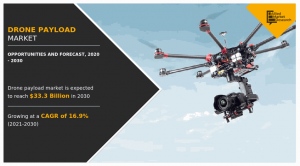Remote ID has been a charged topic in the industry. While some stakeholders feel that the proposed rule must be completely reworked, others have taken the more hopeful view that the rule is a good start towards a workable solution.
As part of our continuing coverage of the FAA’s Notice of Proposed Rulemaking (NPRM) on Remote ID for drones, DRONELIFE is honored to have this exlusive op-ed penned by Lisa Ellman, Global UAS Practice Chair at Hogan Lovells LLP and Executive Director of the Commercial Drone Alliance. DRONELIFE neither accepts nor offers payment for guest posts.
The Commercial Drone Alliance Welcomes Basic Drone License Plate Rules
The Commercial Drone Alliance strongly supports the spirit of the Federal Aviation Administration’s Remote Identification proposal as a crucial step towards expanded drone operations. The Alliance does have concerns about various details of the proposal, but remains optimistic that the major issues can be easily remedied.
The benefits of commercial drones cannot be overstated. Drones deliver supplies, products, and life-saving medical equipment. They assist with law enforcement, fire, accident, and natural disaster response. They support agriculture and inspect and monitor critical infrastructure like bridges, power lines, and wind turbines.
Given the significant benefits of commercial drones to nearly all vertical market sectors, the economic opportunity for the UAS industry is great. One forecast from PwC estimates the global market value of drone-powered solutions at over $127 billion.
However, this opportunity will only truly be realized once the federal government broadly approves operations in urban areas and beyond visual line of sight. Law enforcement and national security agencies have made it clear that remote ID must be implemented to broadly enable these expanded operations—and allow the commercial drone marketplace to open up, for the benefit of all Americans.
The FAA’s recent Remote ID proposal therefore marks a critical step forward. Remote ID is incredibly important as it ensures that federal, state, and local agencies, as well as the general public, have a means of identifying aircraft in order to encourage responsible behavior and investigate incidents. Once finalized, these remote ID rules will enable the continued evolution of the UAS industry and open the door to immeasurable benefits for American citizens, consumers, and business.
The Alliance strongly supports the spirit of the FAA proposal so we can harness this immense potential. The Alliance does have a few substantial concerns with the proposal, and we are preparing formal comments for submission to the FAA. Our primary comments involve promoting network-based solutions, protecting privacy while still addressing the needs of law enforcement and the general public, enhancing flexibility around the FRIA process, including to support the modeler community, and limiting unintended consequences that would unnecessarily restrict commercial and recreational drone operations. We believe these issues can be easily remedied to ensure a sensible and effective rule.
Again, the Alliance stresses that remote ID is a necessary step in expanding UAS operations. By addressing the main issues with the proposal, the public can feel comforted knowing proper safeguards are in place, while allowing innovative and transformative technology to flourish. The Alliance enthusiastically looks forward to working with the federal government and other relevant stakeholders as we seek to unlock the tremendous value of drone operations for all Americans.
Lisa Ellman is Executive Director of the Commercial Drone Alliance and Global UAS Practice Chair at Hogan Lovells LLP. She is a highly sought-after thought leader on drone law and policy. Her opinions have been featured in The New York Times, The Washington Post, Fortune Magazine, and other publications – and she regularly appears on television to talk about the latest developments. Lisa was recently featured in Fortune‘s “Most Powerful Women” series for her efforts to develop policy to govern drone use in the United States. She also delivered a TEDx talk in 2014.
The Commercial Drone Alliance is an independent 501c6 non-profit organization led by key members of the commercial drone industry. CDA works collectively to merge policy with innovation to create relevant rules for operation. CDA educates on the economic benefits, humanitarian gains, safe and responsible use and technology requirements of commercial drones.
Miriam McNabb is the Editor-in-Chief of DRONELIFE and CEO of JobForDrones, a professional drone services marketplace, and a fascinated observer of the emerging drone industry and the regulatory environment for drones. Miriam has a degree from the University of Chicago and over 20 years of experience in high tech sales and marketing for new technologies.
For drone industry consulting or writing, Email Miriam or (for paid consulting engagements only) request a meeting through AdvisoryCloud:
TWITTER:@spaldingbarker
Subscribe to DroneLife here.
https://dronelife.com/2020/02/27/dronelife-exclusive-op-ed-commercial-drone-alliance-on-remote-id/
 Unmanned Aerial Vehicle The latest drone news
Unmanned Aerial Vehicle The latest drone news





